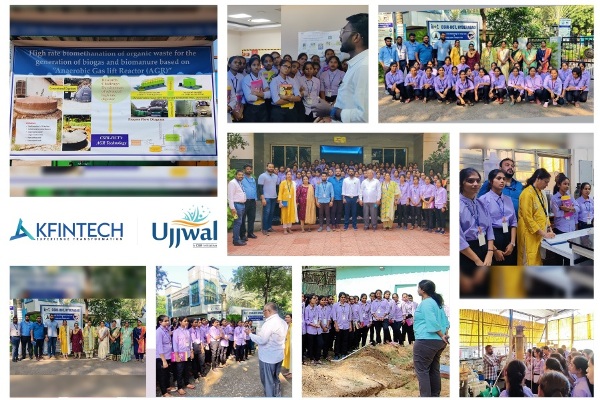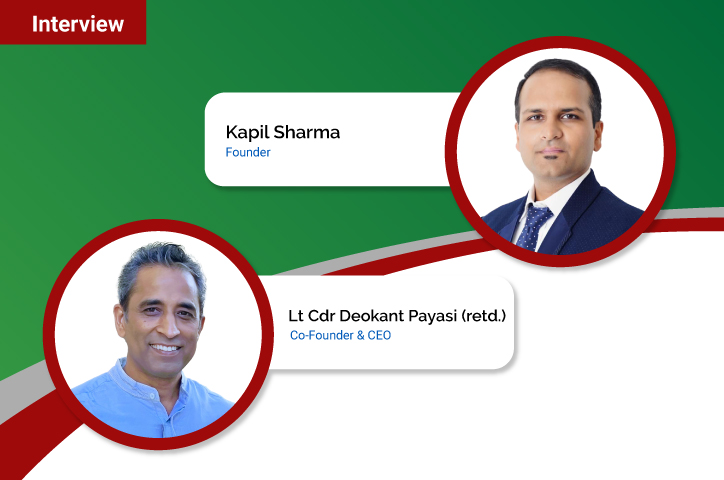 At the intersection of technology and social impact, KFin Technologies, India’s 2nd largest registrar and transfer agent with a market capitalization of nearly a billion dollars, is redefining how businesses can drive meaningful change by integrating sustainability and community development into their core operations. Through its Corporate Social Responsibility (CSR) initiatives, the company has undertaken several impactful projects, including collaborating with The Nature Conservancy Centre for habitat restoration in the Satpura Tiger Reserve and launching efforts to reduce its carbon footprint. In this interview, Mr. Sourav Mukherjee, Head of Enterprise Project Management, Facilities Management and Corporate Social Responsibility (CSR), KFin Technologies, delves into how the company is addressing critical global challenges—ranging from promoting renewable energy and responsible waste management to empowering marginalized communities—while setting a new standard for responsible business practices. Discover the strategies and initiatives behind KFin’s transformative journey toward a sustainable and equitable future.
At the intersection of technology and social impact, KFin Technologies, India’s 2nd largest registrar and transfer agent with a market capitalization of nearly a billion dollars, is redefining how businesses can drive meaningful change by integrating sustainability and community development into their core operations. Through its Corporate Social Responsibility (CSR) initiatives, the company has undertaken several impactful projects, including collaborating with The Nature Conservancy Centre for habitat restoration in the Satpura Tiger Reserve and launching efforts to reduce its carbon footprint. In this interview, Mr. Sourav Mukherjee, Head of Enterprise Project Management, Facilities Management and Corporate Social Responsibility (CSR), KFin Technologies, delves into how the company is addressing critical global challenges—ranging from promoting renewable energy and responsible waste management to empowering marginalized communities—while setting a new standard for responsible business practices. Discover the strategies and initiatives behind KFin’s transformative journey toward a sustainable and equitable future.
Scroll down to read the full interview.
Q&A
Q. Can you provide insights into how KFin is actively addressing specific Sustainable Development Goals (SDGs) among the United Nations’ agenda, and what notable progress has been achieved in these areas?
A. At KFintech, our focus is to actively address the United Nations Sustainable Development Goals (SDGs), particularly SDGs 3, 4, 6, 7, and 11.
Our efforts are focused towards promoting affordable and clean energy across business operations including our head office, branch offices, and data centers.
Through our Corporate Social Responsibility (CSR) program, we align with goals related to tribal development, education, and protecting and restoring wildlife habitats. In tribal development, we are focusing on education and wellbeing of tribal community. We provide scholarships and vocational training to uplift underprivileged communities, empowering them through education and skill-building. For wildlife habitats, we focus on conservation efforts to preserve biodiversity and maintain ecological balance, contributing to a healthier environment.
Q. What is KFin Technologies’ overarching objective in implementing CSR initiatives, especially with regard to its vision for a sustainable and impactful future?
A. Our objective is to create a lasting and meaningful impact on society while aligning with our vision for a sustainable future.
The company initiatives are focused towards 3Cs (Climate, Community and Culture). We believe in coexisting with the communities we operate in, and we integrate sustainable development into our efforts. Our initiatives focus on supporting the next generation, particularly tribal children, in areas like primary education, innovation, technical skills, and financial literacy. Through these efforts, we aim to contribute to community well-being, foster long-term sustainability, and ensure that our growth benefits both present and future generations.
Q. KFin Technologies has implemented several initiatives to reduce its carbon footprint. Can you elaborate on the specific measures taken and their impact?
A. To reduce our carbon footprint, KFintech has introduced a company-wide Carpooling program to minimize carbon emissions, transitioning to renewable energy sources, and adopting energy-efficient technologies integrated within our business operations.
These measures have reduced our energy consumption and greenhouse gas emissions while improving overall efficiency.
Additionally, we have launched a Sustainability Awareness Program to engage our employees with Sustainability practices, providing them with inspiring videos and posters on the importance of Sustainability. We have also installed electric vehicle chargers at our head office to encourage sustainable commuting.
Q. How does KFin Technologies manage electronic waste, and what steps are taken to ensure responsible disposal?
A. We manage electronic waste through a comprehensive Waste Management Policy that includes partnering with government-certified e-waste handlers. This ensures that all electronic waste is responsibly disposed-off, in compliance with government regulations. By working with certified vendors, we minimize the environmental impact and promote sustainable practices.
Q. KFin Technologies has various programs aimed at supporting marginalized communities. Can you highlight some of these initiatives and their outcomes?
A. KFintech is committed to supporting marginalized communities by providing them with educational scholarships to the underprivileged.
As part of our CSR initiative, our focus is on Tribal community, primarily students, many of whom are the first generation of their families to receive formal education.
In Madhya Pradesh, we have installed and maintained fencing to protect villages, set up solar plants and streetlights to improve infrastructure in tribal schools, and introduced sanitary pad vending machines to support the education and hygiene of women in tribal communities. Through these initiatives, we aim to create meaningful changes in the lives of these indigenous communities.
Q. How does the College Transformation Program align with KFin’s commitment to empower the next generation of women, and how does KFintech assess and adapt its skill development programs for workforce readiness?
A. The College Transformation Program aligns with our commitment to empower the future generation by providing enhanced educational opportunities, mentorship, and career development pathways.
We regularly assess and adapt our skill development programs by monitoring industry trends and adjusting the training pedagogy to meet emerging workforce requirements. This approach ensures that participants are equipped with the relevant skills needed for the evolving job market.
Q. How have community-driven innovations, stemming from KFintech’s promotion of participatory planning near the Satpura Tiger Reserve, contributed to sustainable businesses? Additionally, in the context of habitat restoration, could you elaborate on the challenges faced and innovative solutions employed to achieve the ambitious goal of restoring 500 hectares by 2024 in the same region?
A. Of the programs we actively support, one of our focus areas is at Satpura Tiger Reserve, which is a community-driven innovation and has been instrumental in promoting sustainable environment, such as eco-tourism and sustainable agriculture.
One of the key challenges in habitat restoration has been balancing community needs with environmental goals. By involving local stakeholders in participatory planning and employing innovative land management techniques, we are progressing towards our goal of restoring 500 hectares by FY25.
Q. Can you share specific examples of cross-sector collaborations or partnerships that KFintech has engaged in to enhance the impact of its CSR and ESG initiatives, and what valuable lessons have been learned that you believe can be successfully replicated within the social sector?
A. We have engaged in cross-sector collaborations with NGOs, government agencies, and educational institutions to amplify the impact of our CSR and ESG initiatives. These partnerships have enabled us to scale our efforts, particularly in education and rural development.
A key lesson that we have learned is the value of leveraging diverse expertise and resource groups to achieve common goals, which can be effectively replicated across the social sector for greater impact.
Q. How does KFin Technologies ensure compliance with national and international standards for responsible business conduct?
A. We ensure compliance by adhering to rigorous internal policies and external regulations. The board members and other leaders regularly review and update our practices, track regulatory compliance monthly, conduct audits, and provide training to our employees to uphold ethical practices. This commitment to transparency and accountability ensures we meet all compliance requirements.
Q. What measures does KFin Technologies take to ensure diversity and inclusion within the workplace?
A. We foster diversity and inclusion through comprehensive people policies and practices, such as unbiased recruitment, career development frameworks, and ongoing diversity training.
The KFintech leadership team also encourages employees and the resource groups to actively participate in CSR initiatives that promote social responsibility and inclusion. This approach helps us create a dynamic workplace where everyone can contribute and grow.
Q. Can you describe the company’s grievance redressal mechanisms for employees and other stakeholders?
A. KFintech has established strong grievance redressal mechanisms to address concerns from employees and stakeholders.
These mechanisms include an anonymous helpline, specific email addresses, and direct contact with HR and compliance teams. Each complaint is thoroughly investigated, ensuring confidentiality and fairness. We also conduct regular training to keep staff informed about these processes, creating a supportive workplace environment.
Q. What are KFin Technologies’ future plans for enhancing its CSR activities and sustainability efforts?
A. Our plans include expanding our educational programs, improving rural development projects, and boosting environmental sustainability. We aim to increase support for education, enhance infrastructure and health in rural communities, and further reduce our carbon footprint to create lasting positive impacts.





 At the intersection of technology and social impact, KFin Technologies, India’s 2nd largest registrar and transfer agent with a market capitalization of nearly a billion dollars, is redefining how businesses can drive meaningful change by integrating sustainability and community development into their core operations. Through its Corporate Social Responsibility (CSR) initiatives, the company has undertaken several impactful projects, including collaborating with The Nature Conservancy Centre for habitat restoration in the Satpura Tiger Reserve and launching efforts to reduce its carbon footprint. In this interview, Mr. Sourav Mukherjee, Head of Enterprise Project Management, Facilities Management and Corporate Social Responsibility (CSR), KFin Technologies, delves into how the company is addressing critical global challenges—ranging from promoting renewable energy and responsible waste management to empowering marginalized communities—while setting a new standard for responsible business practices. Discover the strategies and initiatives behind KFin’s transformative journey toward a sustainable and equitable future.
At the intersection of technology and social impact, KFin Technologies, India’s 2nd largest registrar and transfer agent with a market capitalization of nearly a billion dollars, is redefining how businesses can drive meaningful change by integrating sustainability and community development into their core operations. Through its Corporate Social Responsibility (CSR) initiatives, the company has undertaken several impactful projects, including collaborating with The Nature Conservancy Centre for habitat restoration in the Satpura Tiger Reserve and launching efforts to reduce its carbon footprint. In this interview, Mr. Sourav Mukherjee, Head of Enterprise Project Management, Facilities Management and Corporate Social Responsibility (CSR), KFin Technologies, delves into how the company is addressing critical global challenges—ranging from promoting renewable energy and responsible waste management to empowering marginalized communities—while setting a new standard for responsible business practices. Discover the strategies and initiatives behind KFin’s transformative journey toward a sustainable and equitable future.












.jpg)


